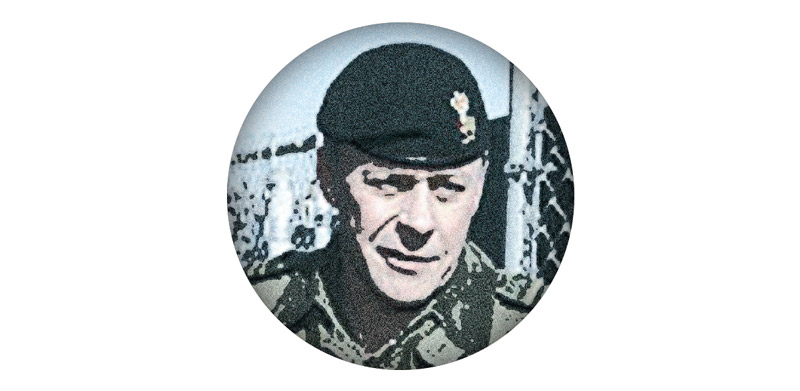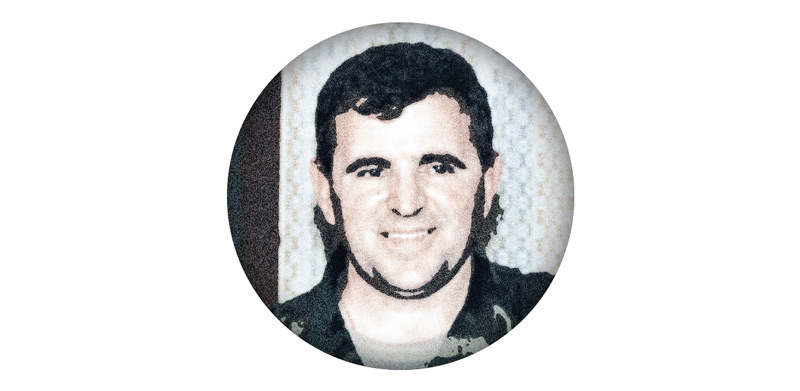
On the morning of Sept. 15, 1993, the United Nations Protection Force commander, French army General Jean Cot, cautioned Canadian Lieutenant-Colonel James (Jim) Calvin that about 400 Serbians inside Croatia’s Medak Pocket faced possible slaughter. Cot also believed that the front-line Croatian soldiers were unaware of a newly brokered agreement: their commanders had agreed to pull back to a position they had held on Sept. 9. In just three days, the Croatians had driven Serbian rebels out of the area. On Sept. 14, Calvin’s 2nd Battalion, Princess Patricia’s Canadian Light Infantry (PPCLI), supported by two French mechanized companies, was tasked to oversee the withdrawal.
Calvin demanded to know why Ademi “was firing at my soldiers for the last six or seven hours.”
At noon on Sept. 15, Calvin advanced one PPCLI company and one French company side-by-side through the Serb lines. The UN force immediately drew scattered fire. When Calvin ordered UN flags deployed on the M-113 armoured personnel carriers, a hail of machine-gun fire resulted. Canadian and French soldiers fired back.
Calvin later described how “for the next 15 hours…a combat situation with the Croatian army [ensued] at ranges of 150 to 800 metres.” Throughout the running engagement, Calvin’s troops were “digging in trenches, under fire, while they were…responding and covering themselves with their own fire.”
“We had made a tragic error. It was clear that the Croatian army had started a serious ethnic cleansing.”
—Lieutenant-Colonel Jim Calvin
That evening, in a diplomatically arranged meeting with Croatian acting commander Brigadier Rahim Ademi, Calvin demanded to know why Ademi “was firing at my soldiers for the last six or seven hours.” Although he offered no explanation, Ademi promised to withdraw at noon the following day to the Sept. 9 line.
The next morning, however, Calvin realized “we had made a tragic error in allowing them until noon to move, because as we looked out over the kilometre that separated us from the Croatians, we could see nothing but billowing smoke starting to go up from every one of the villages…and we started hearing large explosions and…small arms fire coming from all over…within the pocket itself. It was clear to us…that the Croatian army had now started a serious ethnic cleansing session within the pocket, and we were required to…watch for four hours…before we could actually move to the other side.”
In the evening twilight, Calvin entered a smoking village. “We…began to see bodies,” he reported. Over the next few days, evidence that civilians had been murdered was uncovered. Although unable to prevent this tragedy, the Canadian force proved UN peacekeepers would act to prevent atrocities. Calvin was awarded a Meritorious Service Cross in 1995.

When Rahim Ademi’s 9th “Lika Wolves” Brigade fired on Calvin’s UN force on Sept. 15, the expectation was that the peacekeepers would retreat. When the Croatians had attacked Serbian forces in a Maslenica UN protection zone earlier in the year, that’s exactly what happened: the UN troops withdrew rather than being caught between the two enemies. Believing the peacekeepers would not fight encouraged Ademi’s Medak Pocket incursion.
Approximately five-by-six kilometres in size, the region’s four small villages and other small hamlets contained about 400 Serbian inhabitants. Ademi—as set out in a 2001 International Criminal Tribunal for the Former Yugoslavia indictment—individually “or in concert with others” embarked on the “planning, preparation or execution of persecutions of Serb civilians…on racial, political or religious grounds.”
Civilians were systematically killed, while more than 300 homes and outbuildings were destroyed, rendering the area uninhabitable. The tribunal concluded that at least 38 Serb civilians were killed, more seriously wounded.
“Many…were women and elderly people,” the tribunal reported. At least two Serb soldiers taken prisoner were also murdered. During the Croatian withdrawal, there was a free-for-all
looting of anything of value.
Graduating from Yugoslavia’s military academy in 1976, Ademi had served in the national army until deserting in 1990 to join Croatia’s independence movement. In the summer of 1993, he became Gospić military district’s acting commander. On Sept. 15, the Croatians in the region numbered about 2,500, supported by tanks, artillery and rocket launchers. The UN force of approximately 1,000 soldiers was outgunned, but stood its ground and inflicted 27 casualties, while four Canadians were lightly wounded.
The delay bought Ademi time to finish killing Serbs in the area and attempt to cover it up.
That evening, after the UN force chief operations officer, Canadian Colonel J.O.M. (Mike) Maisonneuve met Ademi, he summoned Calvin to negotiate a ceasefire. Ademi said his troops would withdraw at noon the following day. The delay bought Ademi time to finish killing Serbs in the area and attempt to cover it up.
Sufficient evidence was found, however, to enable the tribunal to indict Ademi on crimes against humanity. Briefly imprisoned in 2001, Ademi was released in February 2002 so he could prepare a defence. In November 2005, the tribunal referred his case to Croatia’s judiciary. The County Court of Zagreb ruled on May 30, 2008, that he was not responsible for any atrocities his troops had committed and, in March 2010, the Supreme Court of the Republic of Croatia upheld the acquittal.
Advertisement






















